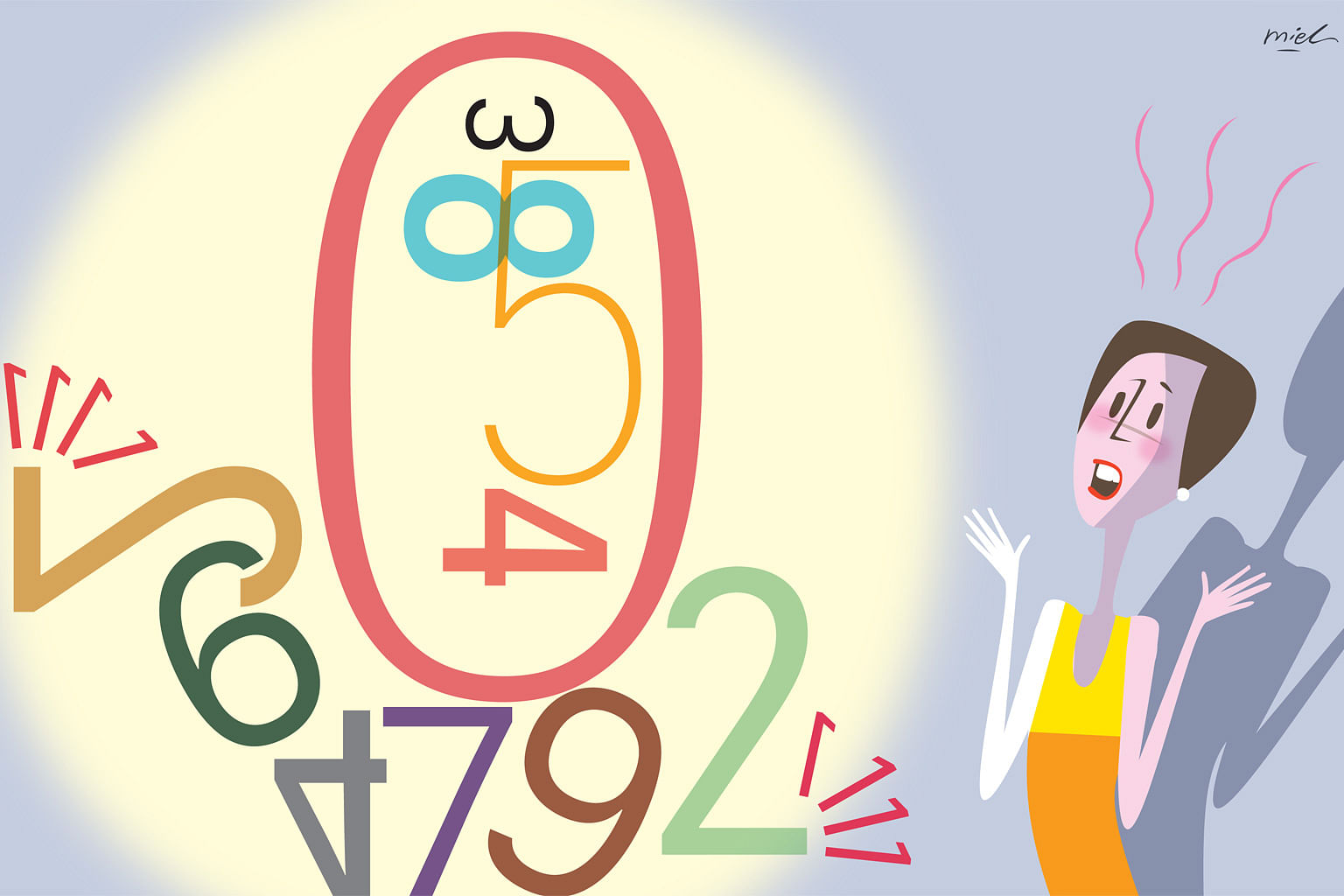I knew we were in trouble when my son looked uncomprehendingly at me, then nodded slowly.
I had been trying for several futile minutes to explain, in growing decibels, the solution to a maths problem sum. Finally, I snapped in frustration: "So do you get it or not?"
He obviously did not, but was scared of admitting it lest it fuelled my irritation.
I knew exactly how he felt. Years ago, I was often in his shoes.
Stumped by my maths homework in secondary school, I used to approach my older brother for help. He would explain once, twice, and then his voice would grow louder as his forehead creased with impatience.

Fearful of an eruption and of appearing stupid, I would feign understanding, just as my son has started to do.
My brother was a straight-A student who breezed through school, so I can see why he laboured to understand how I could not grasp what was patently obvious to him.
But as a maths dunce myself, I should have empathy aplenty. Yet it is precisely because of my phobia of numbers that my fuse is particularly short when I have to help my son with the subject.
I'm upset with myself, not him.
I feel ill-equipped and incompetent as a tutor, never mind that he is only in Primary 3. That is how poor my maths is. I feel guilty and helpless for not being able to explain things better to him.
Mostly, I fear that he will struggle with maths the way I did all the way through my O and A levels.
He attends a weekly maths tuition class but still stumbles over straightforward word problems and repeats mistakes that show he has trouble with certain basic concepts. The cocktail of negative emotions that churn within me is vented, unfortunately, through outbursts of temper.
What is worse, I could be sabotaging my son's maths performance unwittingly.
A study published in the Psychological Science journal last year found that children of maths-anxious parents learnt less maths over the school year and were more likely to suffer maths anxiety themselves, when their parents helped them frequently with maths homework.
The researchers believe this is because kids pick up on the negative vibe and this in turn affects their success. In case you are wondering, maths anxiety is a real psychological condition defined as a feeling of tension, apprehension or fear that interferes with maths performance.
Professor Susan Levine, one of the psychological scientists from the University of Chicago who led the study, explained: "Maths- anxious parents may be less effective in explaining maths concepts to children, and may not respond well when children make a mistake or solve a problem in a novel way."
That is me all right.
There is something else I can attest to: The struggle with maths can have damaging long-term effects.
Experts note that doing well in maths makes kids feel they are smart not just in the subject, but in general. This is a super confidence booster with positive knock-on effects in other aspects of their lives. The reverse is true, too.
While I am good at a few things - I have a flair for languages, am pretty musical and, um, demonstrate quick reflexes during kickboxing lessons - I doubt "bright" is an adjective anyone would ever use to describe me.
This inferiority complex stems largely from my dismal maths performance in school.
I still remember the moment when I realised I really was not very smart.
In Secondary 3, I got back my mid-year additional maths exam paper and was stunned to see that I had scored 39. Out of 100.
It wasn't even anywhere close to a borderline fail. And it wasn't as if I hadn't prepared for the paper. To me, those marks were a clear sign that I was hopeless, and perhaps not just in maths.
You need a quick, agile mind to excel in maths. And since I found the subject fiendishly difficult, it was logical to deduce that my brain cell count couldn't be that high.
I managed passing grades for my O- and A-level maths eventually, but my mediocre results only confirmed my suspicion.
My self-esteem took a big hit and the ripple effects of that last till this day.
Worryingly, cracks are showing in my son's self-confidence, too.
When he did well enough for a recent maths term paper to be picked for an after-school programme that taught more advanced concepts, he begged to skip it. He named a few boys in his class who also made the cut and said: "They are the smart ones. I'm not like them. I won't be able to understand what's going on."
Professor Mark Ashcraft, an expert on maths anxiety from the University of Nevada in Las Vegas, told The New York Times the condition can feed upon itself.
"On challenging maths problems that require a lot of working memory, maths-anxious people fall apart," he said. Their working memory is consumed by worry and anxiety, "and they don't have enough left over to do the maths".
To avoid being a stumbling block in my son's maths learning journey, I decided I had to act.
I flipped through his textbook for an overview of the syllabus and practised sums from his assessment book to get the hang of the modelling method that schools now use. Then I went online for tips on how to teach the subject more effectively.
The most reassuring words come from Dr John Mighton, a former maths tutor in Toronto who went on to develop Jump (Junior Undiscovered Math Prodigies) Math as a charity in 2001. Its website offers free teaching guides and lesson plans for educators and parents.
Everyone, he says, can learn maths at a very high level, to the point where they can do university-level maths courses.
His Jump Math curriculum, based on breaking things down into minute steps to slowly build confidence, bears this out. It has yielded impressive results in some Canadian and British schools, which adopted the programme for students who struggled the most with maths.
Dr Mighton, who is also a playwright and author, designed Jump Math based on his own experience. He nearly failed his first-year calculus course, but trained himself to break down complicated tasks and practise them until he got the hang of things. He went on to do a PhD in mathematics at the University of Toronto.
"No step is too small to ignore," he once said in an interview. "Maths is like a ladder. If you miss a step, sometimes you can't go on. And then you start losing your confidence and then the hierarchies develop."
I'm starting at the bottom of the ladder by going through free worksheets from various websites with my daughter, who starts Primary 1 next year.
And as I grow more adept with my son's maths syllabus through practising on my own, I hope I can rebuild my confidence and help him to do the same.
He is counting on me.
• Tee Hun Ching, a former editor and copy editor with The Straits Times, is now a freelance journalist.



